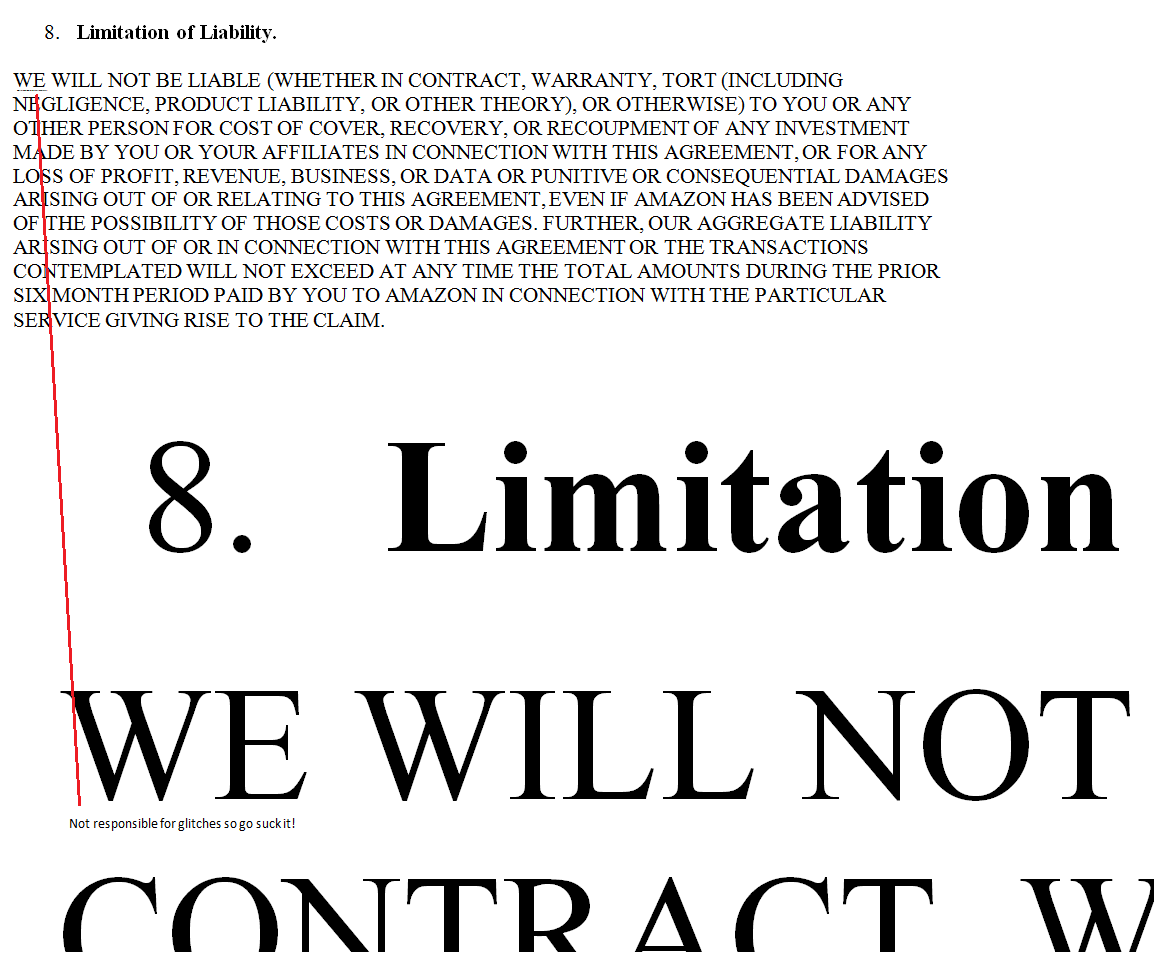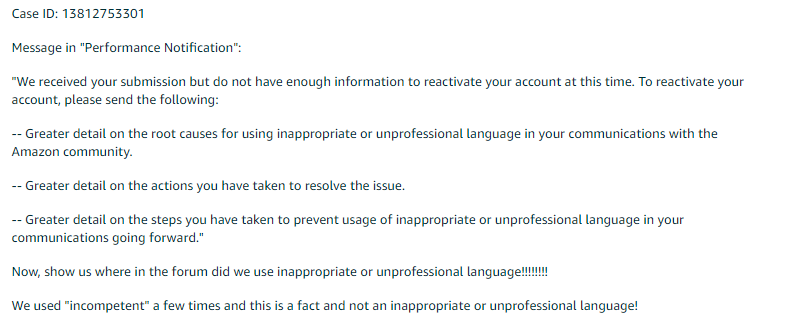Just to throw annother possibility out there. Could unhappy programmers coming back to work be throwing a money wrench into the mix?
That should have been a monkey wrench, not a money wrench. lol
But they aren’t hurting Amazon, if that’s who they’re presumably unhappy about.
Amazon is keeping the 3P money and blaming 3Ps for it. That seems like the opposite of “Amazonian insider sabotage”. If it’s unhappy programmers, then why are they enabling typical Amazon bullying?
I was thinking more along the lines of damaging Amazon’s reputation. How they are screwing the little “people”. How that might look to someone who’s investigating the abuse of 3Ps. But it was just a thought. I can be totally wrong. lol
Hmmm…maybe they actually hate MasterCard ![]()
Zinger!
Wonder what the DSM classification of that particular fear might be - triskacardaphobia? ![]()
But isn’t Mastercard the Amazon favored card for buyers? I know I have one. An Amazon Mastercard.
Ever since Visa and Amazon reached last year’s agreement in their long-running dispute, I’ve seen far more entreaties, on this, that, t’other PDP, to secure an Amazon Visa card than I’ve seen of those beckoning me to secure an Amazon MasterCard (the reverse was previously observable, from my end, with both our ‘Primary’ SoA Account-associated Buyer Account, and in personal [supposedly non-associated] Buyer Accounts to boot).
In a new post on NSFE, this seller is reporting that they are getting screwed over by it:
Our account was deactivated for 47 days due the so called MasterCard “glitch” and all of sudden, on day 48, the account was reactivated and at the same time deactivated due the non shipping orders.
And of course, Amazon and its incompetent people do not take responsibility not do they seem willing to help.
Our account health and performance was flawless. We always shipped on time, never had a late shipment or delivery, no Order Defect Rate, no A-to-z Guarantee claims.
Now, we have a high Order Defect Rate and A-to-z Guarantee claims, since we were not able to ship orders.
In addition to that, our listings are removed, our FBA products stranded in the warehouses, and our money withheld.
Amazon destroyed our business on their platform and also our business future there.
Yes, and I’ve come to consider that OP the ‘poster child’ for the Great Mastercard Snafu of 2023, because s/he’s posted credible responses to most all of the related NSFE discussions, including to one of the original bellwethers of those which they themselves created several weeks back (where Micah, after some initial cluelessness in the first reply, pledged to help with the ESR last week) :
https://sellercentral.amazon.com/seller-forums/discussions/t/e15e5cde-815c-4b19-8f9a-33a6eadb6ea2
Ok, I’m gonna have to say this is partly the seller’s fault.
They sat on their hands for 47 (!) days instead of trying to use a different credit card to resolve it earlier.
I don’t fault them for that.
Many businesses only have one business credit card–and they might only have that one because online sales channels require it, but they do most business in cash/by check (low debt).
And they might not have wanted to add anyone’s personal credit card–even temporarily–for 4 reasons:
- They didn’t want some snafu to end up charging/overcharging a personal card.
- They didn’t want Amazon to link accounts.
- They didn’t want to cross the business stream and the personal stream.
- They didn’t know it would take 47 days for Amazon to fix what seemed like a basic easily-fixable glitch.
I’m not saying I would or wouldn’t have taken the same path, but I can certainly understand that different businesses have different operations, structures, and limitations.
This is on Amazon, not the Seller.
While true, a big part of playing the Amazon game is adapting to and playing around Amazon’s systems, which includes curveballs like this that they throw at you.
Many sellers were impacted by this and survived it by figuring out a solution is to use a different credit card.
Over the years I’ve had many various issues with Amazon and many solutions to those issues. None of the solutions were “this is Amazon’s responsibility to fix,” or “Amazon is wrong!” That line of thinking will result in a suspension.
And there might be many more who did not, but we only know of one case published on the NSFE thus far.
And again, this was NOT a problem with the card itself, but with Amazon failing to process it properly. Typically, something like this would resolve within a couple of weeks.
__
Ok, but that’s not this.
I could see this being a viable option if you were an individual seller but a legit business cannot just slap a personal CC on an actual business for financial / reporting reasons.
This is Amazon’s fault, plain and simple and it’s astonishing that these sellers are being punished and flipped on their backs like a turtle. Sickening.
Be that as it may, the fact remains that the seller is now suspended. And the path to reinstatement likely lies in a POA where the seller takes responsibility for the problem. Anything else would just be shouting at a wall.
If Amazon tells me to jump, I jump without question (you don’t ask Amazon “how high,” you do the research yourself to determine appropriate height) and then ask “is there anything else you would like me to do?”
If Amazon can’t charge my card, I get a new card. If they can’t charge a mastercard, I apply for a Visa, and in all cases I get the card overnighted to immediately resolve the problem. If Amazon demands my immediate attention I stop whatever I am doing and work on it until I have a solution.
I agree that this is Amazon’s fault, but pointing that out to them is unlikely to get them to reinstate an account after it’s already suspended (not to mention already losing out on a month and a half of sales). If you rely on Amazon for your business it’s best to approach every problem as “how can I get this resolved ASAP?” Amazon has no problem just blocking a seller.
I spent 4 hours a couple weeks ago on a BS case writing up documentation that Amazon asked for, and editing it according to what they said to do. Telling them that their request makes no sense would just result in an ASIN suspension.
So just as a double check, are you a multi-million dollar corporation, with board of directors, and policy that dictates who can simply “get a new card” or open other lines of credit for the company?
As others have pointed out, this is a possible (although still in the category of “should not be needed”) option, but for a business larger than a partnership, it’s non-trivial. And most certainly should NOT be required to jump through hoops because of a systemic error at Amazon.
(Note, I have no idea about the particulars of the OP; but don’t blame the victim unless you DO know the particulars)
If it’s a multi-million dollar company that is dependent on Amazon sales to stay in business, I would imagine a problem of this severity would go straight to the CEO, who most certainly has authority to take such action.
All I’m saying is if Amazon is important enough to a seller they’ll find a way and work nonstop to find a solution for any problem that comes up. The other option here is to let it play out as it did, and potentially go to litigation over it if Amazon doesn’t make it right (and chances are they won’t bother helping these sellers). Which is great if your business is NOT reliant on Amazon and you can wait a year or two for the case to go to arbitration.
In your example, if it’s a big company that’s gets 100% of it’s revenue from Amazon, and they get locked out of their account because the credit card isn’t chargeable and it isn’t easily resolvable, you can bet there will be a meeting between all the important decision makers immediately to figure out a solution and do what needs to be done to resolve it.
Like the OP of this thread here, came here to research the cause of the problem, found out the issue, and resolved it, and guess what, they’re still selling today (granted, SAS members have better problem solving skills than the average seller). If they just waited for “Amazon to do the right thing,” then they’d be suspended as well with no solution in sight. And the time spent on that is a lot less than the time required to try to fix up Amazon’s mess after the fact.
There’s a blog post about this as well:
The answer to that question is probably NO. Ultimately the onus is on the seller to make things right even when Amazon does them wrong (as litigating is not financially feasible for most sellers). Remember, sellers need Amazon, Amazon does not need individual sellers. They also know this and treat them accordingly.

